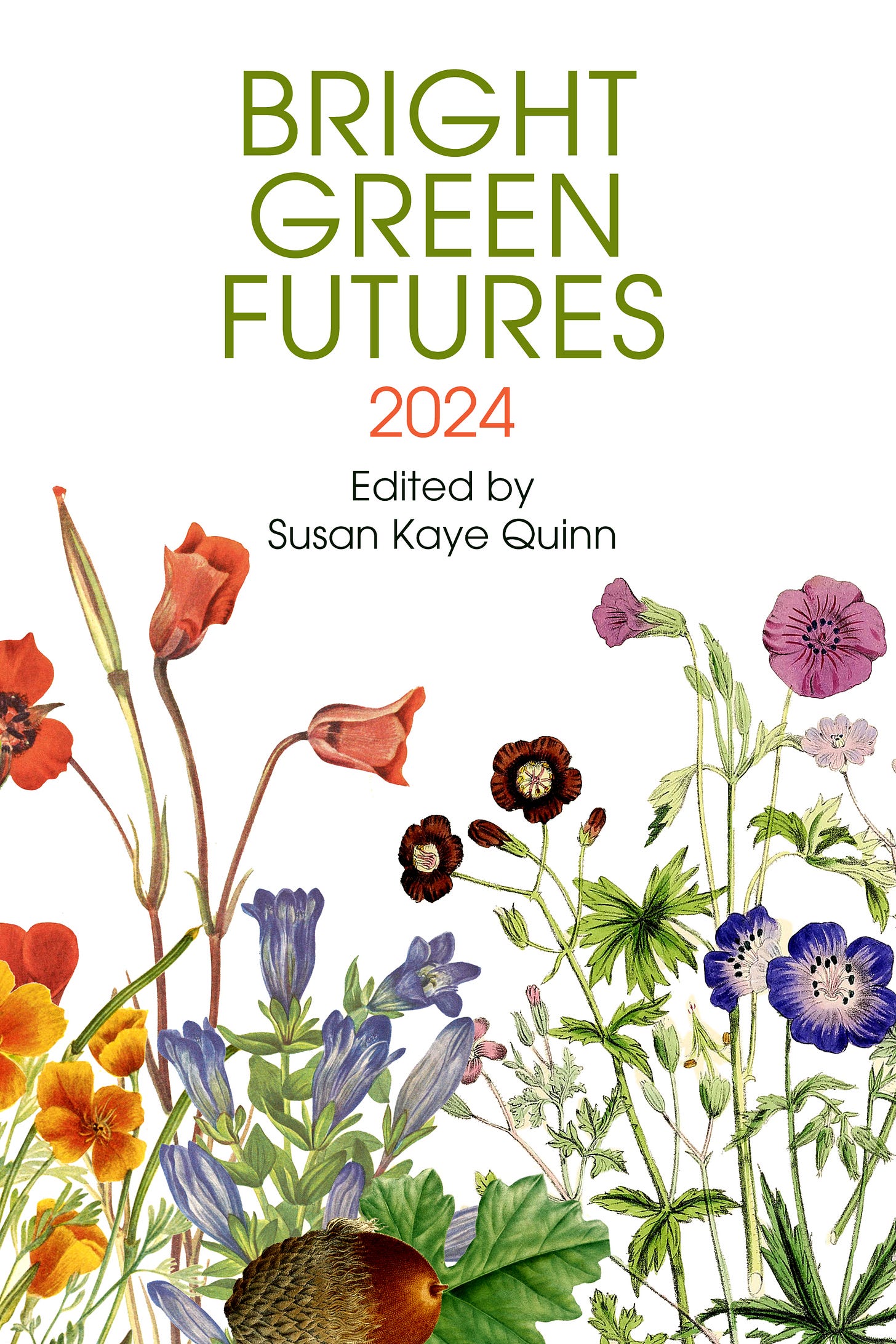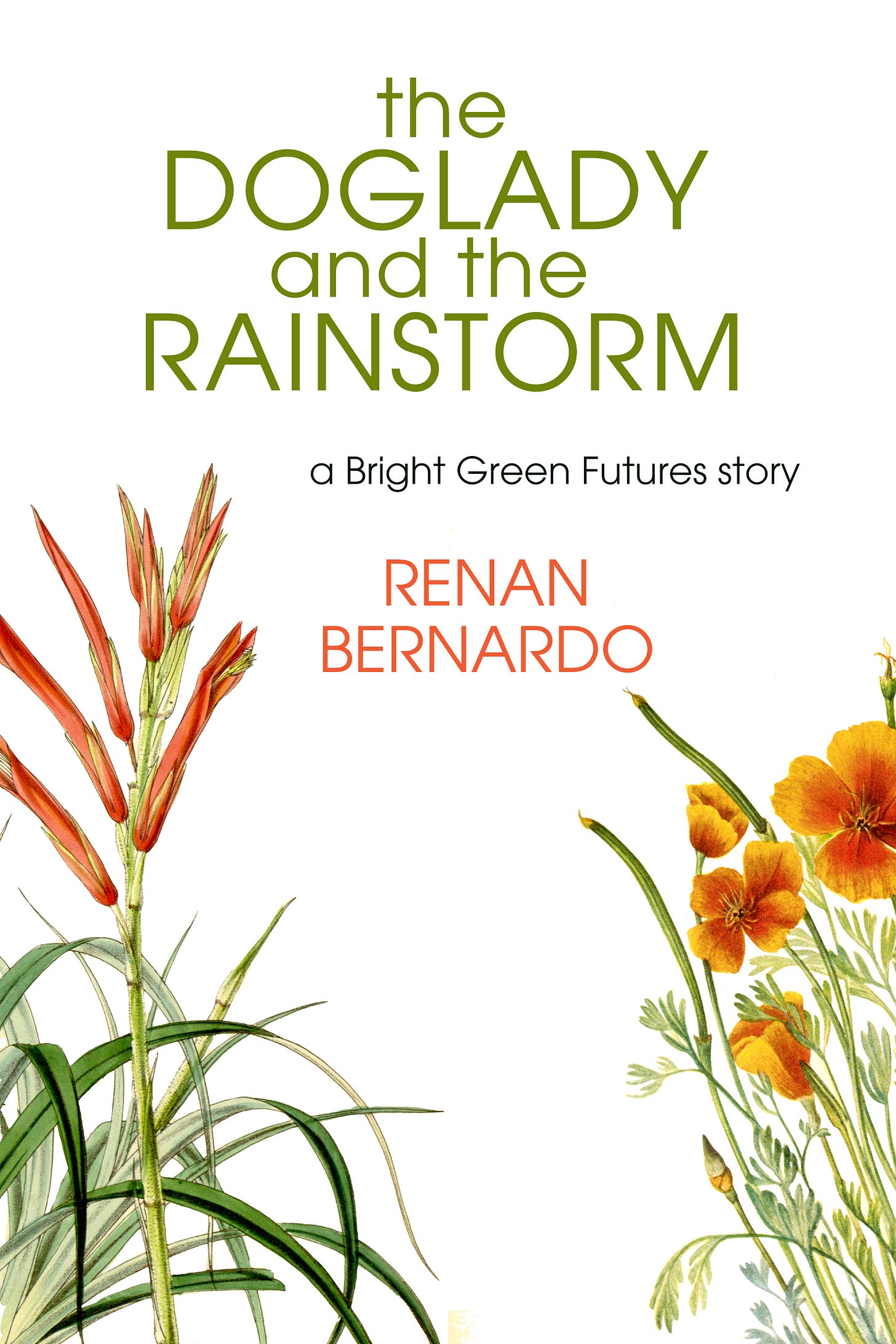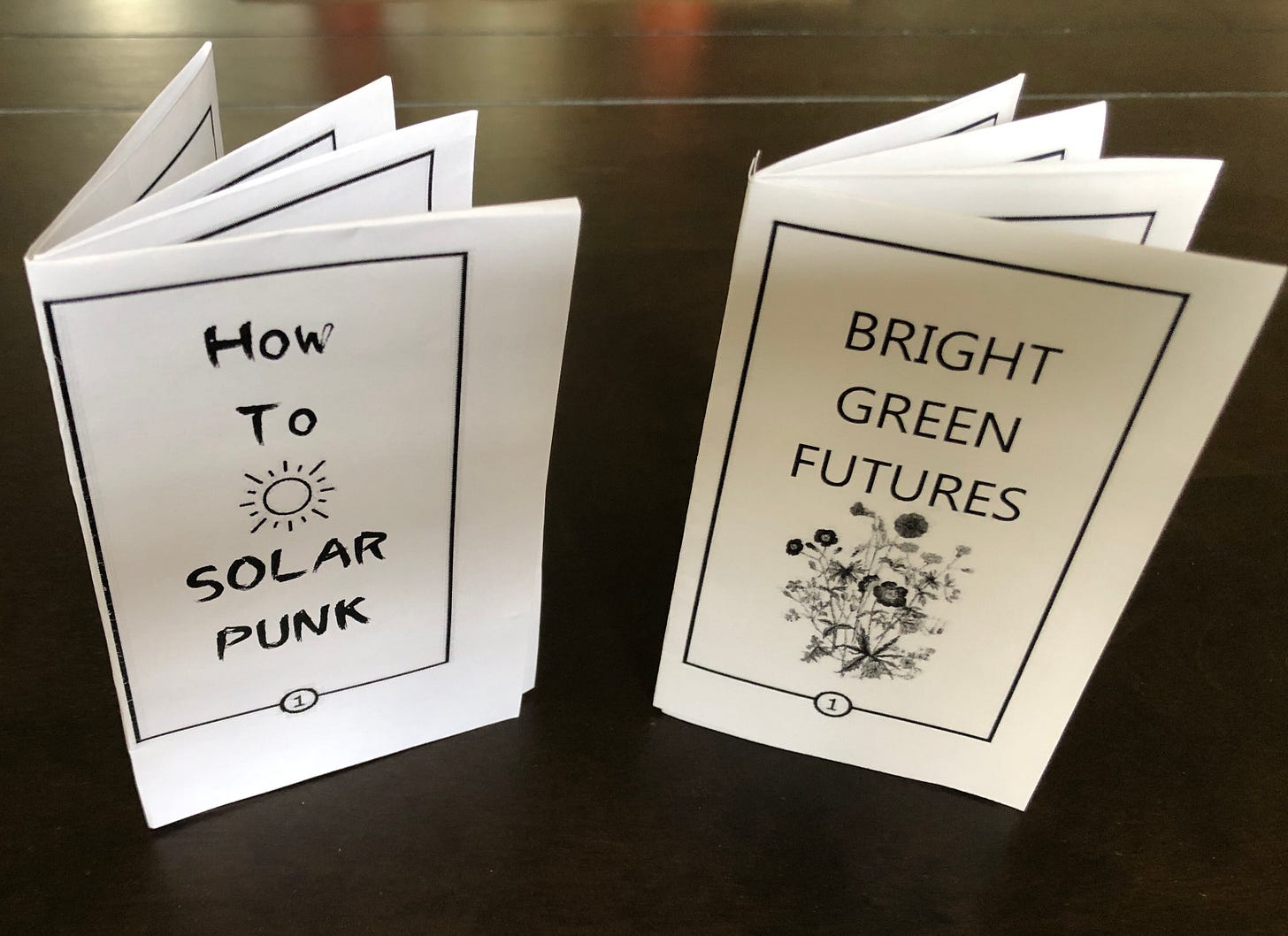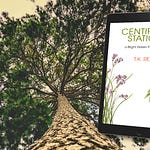In this episode, I chat with author Renan Bernardo about his new story in the upcoming Bright Green Futures anthology, why he picked Climate Anxiety as a theme, and his giveaway item coordinated with his story.
Text Transcript:
Susan Kaye Quinn
Hello friends! Welcome to Bright Green Futures, Episode 28: Climate Anxiety with Renan Bernardo.
I'm your host, Susan Kaye Quinn, and we're here to lift up stories about a more sustainable and just world and talk about the struggle to get there. Today, we're gonna have a quick chat with Renan Bernardo about his story, The Dog Lady and the Rainstorm, in the new Bright Green Futures anthology, which is now available for pre-order.
But first, there are three things listeners should know.
The anthology is a collection of hopeful climate fiction stories from guests on the pod and is available for pre-order, like I said, in ebook and print on a wide range of retailers, including bookshop.org, which supports independent bookstores.
Secondly, Renan's story is published separately as an ebook and is free right now. So make sure you go download that after the show.
And thirdly, we're running a giveaway of really cool stuff handpicked by the authors in the anthology, each item having a connection to their stories, everything from art to plushy bats to notebooks, lots of cool stuff. So make sure you go check that out. The links for everything are in the show notes and also on the Bright Green Future substack.
Renan! Thank you for coming back to the pod.
Renan Bernardo
Hello, Susan. Thank you for having me here. It's an honor to be part of this anthology.
Susan Kaye Quinn
I'm excited to talk to you and the rest of the authors. It's a special treat for me to have everybody come back on for a minute and talk about the stories and the anthology. And part of that that I'm really enjoying is the theme words that everybody has picked out. And there's one for each story and they kind of tell a meta story about what the anthology is about. And I think what hopeful climate fiction can do. And so I think the anthology is a really good representation of that.

So as part of that, I asked each of you, the authors of the anthology, to pick a theme word, something that resonated with and represented the story. And you picked climate anxiety, which of course fits completely with your story. So can I get you to read the one line description of the story and then tell us a little bit about that theme?
Renan Bernardo
Yeah, of course. So the one line description is:
Joseane lives her dream, walking her furry friends in a city of canals, but Rio’s waters touch everyone… and her scars haven’t yet healed.
So I feel like climate anxiety is worse each year. And it's something that certainly will stay with us for a very long time in one way or another. And I feel it right now, you probably do too, at some extent. Probably the listeners do feel it too.
It's that feeling of dread about our future, not only as individuals, also as individuals, but not only, but also as part of communities and as a species. And when I wrote The Doglady and the Rainstorm, I wanted to mix that feeling of climate anxiety with a sense of hope.
This story is set in a future version of Rio, where the worst has passed, but the consequences are pretty clear all around the city. But Joseane, which is my protagonist, she's afraid of hard rains because she lost her home and her grandfather in a flood in the past. The sea levels have risen and her city is profoundly changed.
But things are starting to get better now, people are adapting. So the main thing that has stayed with her is this sense that things can go wrong. And I wanted to explore this in the way she takes care of the vulnerable, the vulnerable beings in her life. First her grandfather, then the dogs that she walks for a cooperative, that takes care of street dogs, not only street dogs, but dogs in general, and pets and cats too. She fears for herself, she has this anxiety for herself, but also for the ones she loves, for the tutors of the dogs she's taking care of, for the dogs themselves. And she's always dealing with this in her journey, even though she needs to learn that things are getting better for her, which is something that we hope for us too.
That things are pretty dire now, but things will get better.
Susan Kaye Quinn
Having that hope for some kind of healing out of whatever your trauma might be…we're all kind of… I think I heard a statistic, something like one-in-three people in the United States already have had personal experience with some kind of climate disaster. And those numbers are just going to go up. And so there's a lot of trauma out there around it, even if you haven't personally experienced it, there's that overwhelming dread that you talked about that can be very crippling. But especially if you have actually lived through disasters and trauma—we need to be really aware of that need for people to heal and have room for healing.
I love that part of your story: that the characters, they give her room.
I don't want to spoil the story too much. I'm a little afraid of talking too much about it, but it's characteristic of many of your stories that has just a lot of heart in it and people who care about each other. And I love that. That's one of the reasons why I think your stories fit so well in this genre, because we need to have that sense of taking care of each other. Or taking care of our furry friends like she does in the story. There's always somebody around that needs somebody… we need to work together and stick together and take care of each other. So I love that a lot. And it's hard to when the person who's at risk or the being who is at risk is not you, but it's somebody that you care about. Right?
When the fires came through Los Angeles here a couple of months ago, my kid had to evacuate. And that's like the first time that I personally had one of my kids in the way of a climate-driven disaster. And I was like, this is so much worse than if I was the one that had to evacuate because it's the person you care about. And there's that vulnerability and fear and anxiety and all of those things… and then you get through it and but it still hangs over you.
Renan Bernardo
Yeah. And at the same time, you can't… yourself, you can control, but the others, you cannot control their actions. You don't know what's going to happen. So, you know, that it comes full blown.
Susan Kaye Quinn
Yeah, that's so true. There's so much that we can't control. So the parts that we can control, like being compassionate and making space for people's trauma and stuff like that is super, super important.
Which is one reason why I love your story. And one of the reasons I put your story first in the anthology—it just kind of was a natural fit, as people can tell, maybe even from the theme words—but I think we just have to be upfront about, okay, there is anxiety. There are bad things here. We're going to talk about these. We're not ignoring those. That is part of solarpunk, that we have to acknowledge the hard things and then also do the other things that are going to make it better. So I super appreciate that you were willing to bring your talents to the anthology and have your story be in the collection.
Renan Bernardo
Thank you. It's such an honor to be there. And these authors I admire so much.
Susan Kaye Quinn
It is really a great bunch. I am very pleased and excited for people to read these stories when the anthology comes out. But we also have a fun giveaway going on. So let's talk about that real quick. Your giveaway item is a trio of mini spiral bound notebooks made of recycled paper with these very lovely illustrations of plants on the covers.
They're very reminiscent of the botanical flower illustrations that we have on the cover of the anthology. So that was kind of fun. But on top of that, there are seeds embedded in the paper of the notebooks. So you can literally like write down your thoughts and then like literally plant them, which I love. I love that. And can you tell us why you picked these? I mean, it's obviously very cool, but if there was any additional reason as to why you pick these seed notebooks for your giveaway item.
Renan Bernardo
Yeah, one thing I do, and I know that other people do, actually I know that many people do it, is that one way to deal with anxiety is to write. So it can be a piece of fiction or it can be your own thoughts. But writing is one of the best ways we have to put our thoughts in order. Be it through your own voice or the voices of characters.
So I thought about these notebooks, but also as ways to make wishes or write your dreams for the future. What do we want to happen maybe 10, 20 years from now? Then you can, as you said, literally plant them and see how life can change quickly and that the anxiety we feel right now might not be real in the future.
Things can get better no matter how bleak they seem right now. Thoughts are seeds of the future. Our words, what we produce right now, are the seeds of the future. Our ideas are the seeds of the future. In the case of these notebooks, it's quite literally.
Susan Kaye Quinn
I love that. I love the idea of planting seeds. It’s such a powerful metaphor for what we can do now and create the future that we want by planting the seeds today.
I was having a conversation with someone else about this, how not all the seeds are going to germinate and grow, like they have to find fertile ground to be able to have that happen. And you never know. You don't know which seeds you're going to plant are going to be the ones that are going to find the right conditions to grow. But you can be sure that if you don't plant any seeds, that nothing's going to happen. It's an act of faith, and almost magical. I always think seeds are just magic anyway. Like this tiny little thing turns into a plant. What? It just seems like... I mean, I understand it's science, right? I understand the science, but also at the same time, it feels like magic to me. So the metaphor works for me on a bunch of levels.
And it also reminds me of the Bright Green Futures zine, which we just talked about recently on the pod and how the zine, which you can go and download from the website, talks about how these hopeful stories are seeds that you can plant for a better future.
I think that's what we're all doing as authors, but the readers too. Like when you read it, you're planting seeds in your own emotions and mind and when you share those stories, you're doing the same for the people that you share with. So this is something that I love that we all can kind of collectively do, help each other to create these stories and plant them and help the future be the kind of future we all want.
We're gonna get to the end here. I'm making these short, although I love talking with you and I could go on forever, but I'm gonna get to our end question that I asked for everybody, the end of most of my podcasts.
Q: What are you doing in these crazy times to stay grounded and keep working for a better world?
Renan Bernardo
Well, I'm writing and reading. I think that occupying my head space with writing and reading fiction, and not only fiction, but a lot of fiction, is a good way to stay grounded. I like to be outside a lot, to walk on the streets, to be in touch with nature, with people, also with the humbug of people in the streets.
Those are things that kind of keep me sane in these times. Sometimes I have to doomscroll, sometimes I have to watch the news and then, but I always try to separate those things in their particular moments too. So I can not go fully crazy all at once. But back to reading, think reading transformed my life years ago and still constantly does. So I really hope that my writing can also resonate with readers even if in some small way.
Susan Kaye Quinn
I'm sure it will. And I am always moved when I read your work because, like I said before, this sort of emotional character to it that I really enjoy in the story. This anthology is no lie very much like the the top hits of like Sue's favorite authors just kind of wrote an anthology for her. And I'm pretty excited about that. And I'm excited for other people to discover that work as well.
So thank you so much for coming on the pod again and sharing with us. And I really hope that people go download your story, which is free right now, and pick up the anthology when they get a taste from that.
Renan Bernardo
Thank you for having me here, Susan. It was a pleasure.
In this series of episodes, we'll have each of the authors of the anthology on to talk about their story, their theme, and their giveaway item. The links for everything are below. As a quick review, the six themes for the six stories are:
CLIMATE ANXIETY
CLIMATE RESTORATION
CLIMATE ROLES
CLIMATE CONNECTIONS
CLIMATE RESILIENCE
CLIMATE HERITAGE
They fit together almost like a meta story, and the themes and the stories showcase what hopeful climate fiction can look like and the breadth of what we need to tackle. Each of these writers is helping to illuminate a way forward.
The world does not have to be the way it is, and these writers are using their pens to show a better way. We need a million stories like these in the world. Publishing the anthology is my way of getting a few more out there.
Pre-orders boost the visibility of the anthology, so please do that if you can. And go ahead and download Renan's story while it's free. You can also help spread the word about the anthology by downloading the free zine and sharing it with your friends, especially if they're struggling in these difficult times.
Anthology Giveaway
That giveaway will be ongoing, starting now, through launch on Earth Day, April 22nd and ending at the end of May. In each of the upcoming episodes, we’ll talk about the giveaway items and their connections to the stories.
Check out the Featured Stories and Hopeful Climate Fiction lists.
LINKS Ep. 28: Climate Anxiety with Renan Bernardo
Ep 27: Zines, Cultural Change, and Storytelling in the Underground
Renan’s story (FREE until 4.22.2025): The Doglady and the Rainstorm
PLEASE SHARE

These hopeful climate-fiction stories include clicky space centipedes, sentient trees, a flooded future Rio de Janeiro and characters trying to find their place in a climate-impacted world. Each story imagines a way for us to survive the future, together.
Bright Green Futures: 2024 contains six short stories plus a bonus prose-poem.
The Doglady and the Rainstorm by Renan Bernardo
What Kind of Bat is This? by Sarena Ulibarri
Centipede Station by T. K. Rex
A Merger in Corn Country by Danielle Arostegui
Ancestors, Descendants by BrightFlame
The Park of the Beast by T. K. Rex
Coriander by Ana Sun





















Share this post